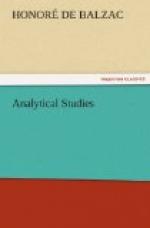“How they love each other!” says Caroline to herself.
By dint of nervous headache, Caroline conceives an exceedingly ingenious plan: this plan consists in using the conjugal bliss of the opposite neighbors as a tonic to stimulate Adolphe. The idea is not without depravity, but then Caroline’s intention sanctifies the means!
“Adolphe,” she says, “we have a neighbor opposite, the loveliest woman, a brunette—”
“Oh, yes,” returns Adolphe, “I know her. She is a friend of Madame de Fischtaminel’s: Madame Foullepointe, the wife of a broker, a charming man and a good fellow, very fond of his wife: he’s crazy about her. His office and rooms are here, in the court, while those on the street are madame’s. I know of no happier household. Foullepointe talks about his happiness everywhere, even at the Exchange; he’s really quite tiresome.”
“Well, then, be good enough to present Monsieur and Madame Foullepointe to me. I should be delighted to learn how she manages to make her husband love her so much: have they been married long?”
“Five years, just like us.”
“O Adolphe, dear, I am dying to know her: make us intimately acquainted. Am I as pretty as she?”
“Well, if I were to meet you at an opera ball, and if you weren’t my wife, I declare, I shouldn’t know which—”
“You are real sweet to-day. Don’t forget to invite them to dinner Saturday.”
“I’ll do it to-night. Foullepointe and I often meet on ’Change.”
“Now,” says Caroline, “this young woman will doubtless tell me what her method of action is.”
Caroline resumes her post of observation. At about three she looks through the flowers which form as it were a bower at the window, and exclaims, “Two perfect doves!”
For the Saturday in question, Caroline invites Monsieur and Madame Deschars, the worthy Monsieur Fischtaminel, in short, the most virtuous couples of her society. She has brought out all her resources: she has ordered the most sumptuous dinner, she has taken the silver out of the chest: she means to do all honor to the model of wives.




